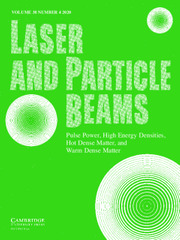Article contents
Radiative reaction effect on electron dynamics in an ultra intense laser field
Published online by Cambridge University Press: 21 January 2010
Abstract
The radiative reaction effect of an electron is usually very small and can be neglected in most cases. But for an ultra intensity laser-electron interaction region, the radiation can become large. The influence of the radiative reaction effect of an electron interacting with an ultra intense laser pulses in vacuum on electron dynamics is investigated within the classical relativistic Lorentz-Dirac approach. A predictor-corrector method is proposed to numerically solve the equation of motion with the electron radiative reaction included. We study the counter-propagating case (for Thomson scattering scheme) and the same direction propagating cases (for laser acceleration). Our simulation results show that radiation can have great effect in the counter-propagating case. But in the vacuum laser electron acceleration regime, both the ponderomotive acceleration scenario case and the capture and acceleration scenario, radiative reaction effect can totally be ignored for laser intensity available presently or in the near-future.
- Type
- Research Article
- Information
- Copyright
- Copyright © Cambridge University Press 2010
References
REFERENCES
- 7
- Cited by


